Analyzing Climate Change Impact in the Tourism Industry
VerifiedAdded on 2022/08/21
|8
|3110
|12
Essay
AI Summary
This essay delves into the significant impact of climate change on the tourism and hospitality industry, highlighting its effects on seasonality, tourist destinations, and activities. It explores how climate change increases natural hazards like flooding and storms, degrading the tourism business, and emphasizes the industry's shift towards mitigating and adapting to climate change through innovative measures in infrastructure, laws, and competitive requirements. The essay discusses the energy-intensive nature of tourism, its contribution to greenhouse gas emissions, and the importance of sustainable practices, including changes in aviation, market bases, and tourist behavior. It further examines the vulnerability of tourism in different regions, such as Africa, and the adaptive measures taken to address rising temperatures, sea level rise, and pollution. The essay also covers green services, entrepreneurial investments, and the role of government in supporting sustainable tourism practices, concluding with the importance of early warning systems and sustainable adaptations to ensure the long-term viability of the global tourism industry.
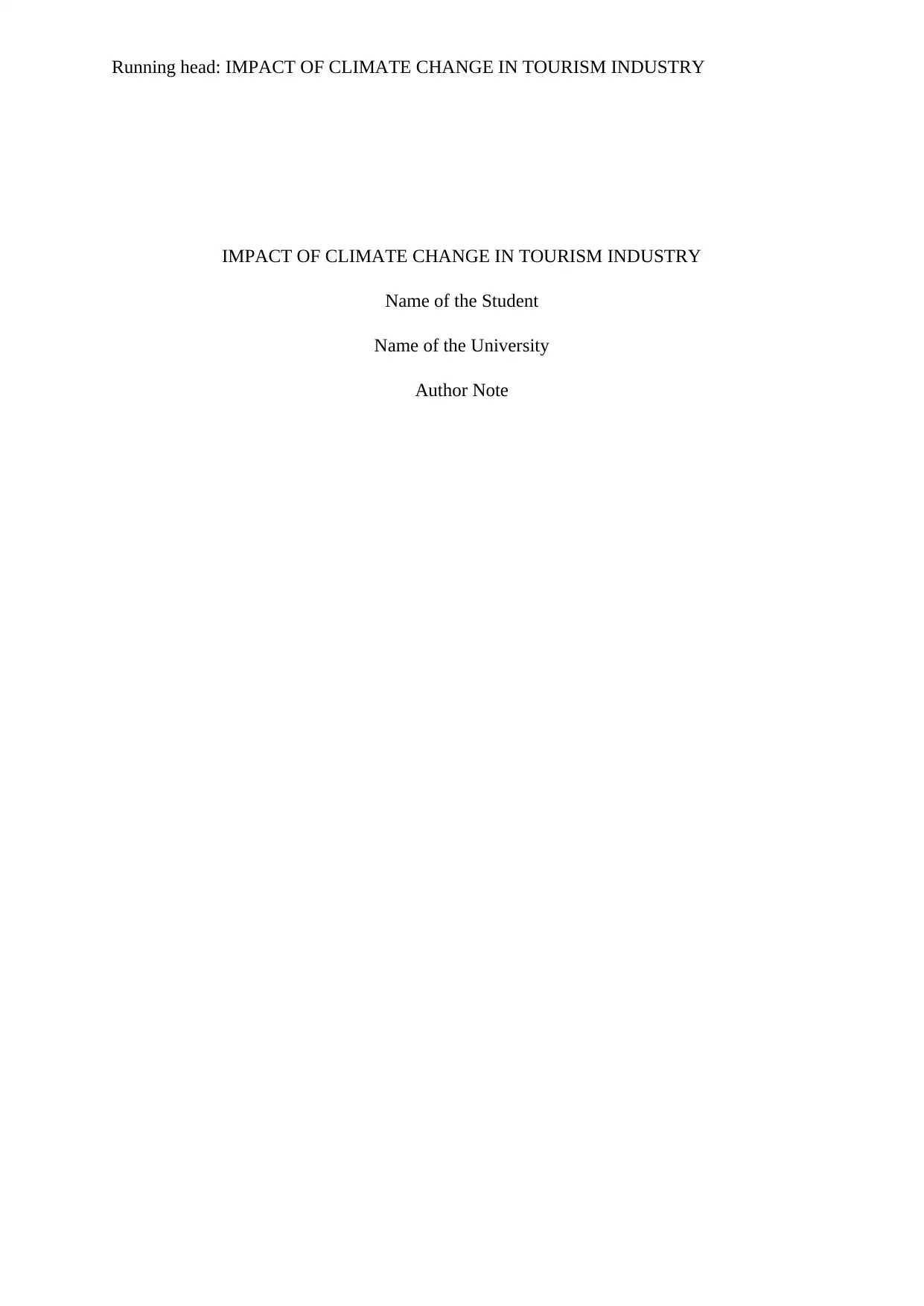
Running head: IMPACT OF CLIMATE CHANGE IN TOURISM INDUSTRY
IMPACT OF CLIMATE CHANGE IN TOURISM INDUSTRY
Name of the Student
Name of the University
Author Note
IMPACT OF CLIMATE CHANGE IN TOURISM INDUSTRY
Name of the Student
Name of the University
Author Note
Paraphrase This Document
Need a fresh take? Get an instant paraphrase of this document with our AI Paraphraser
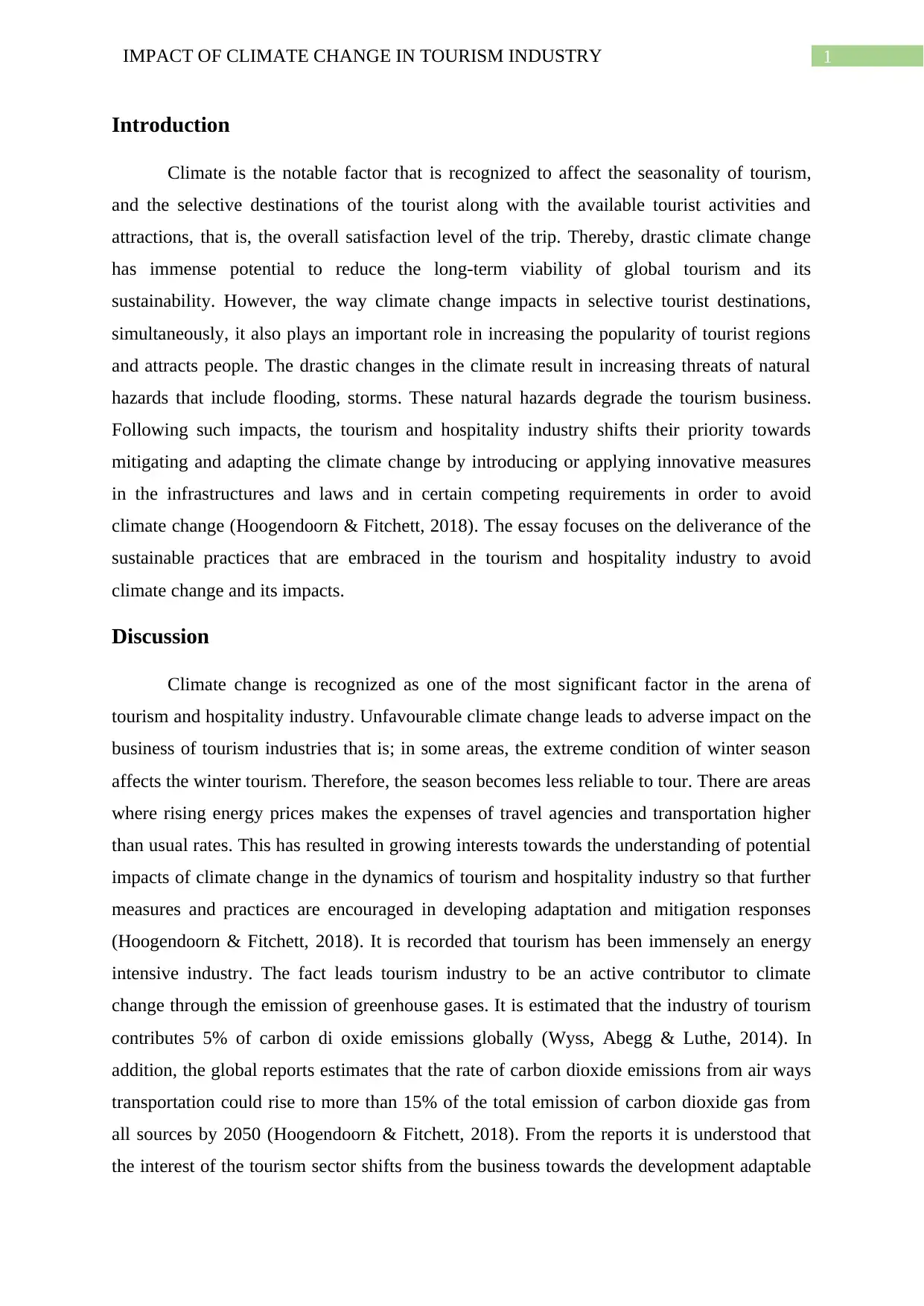
1IMPACT OF CLIMATE CHANGE IN TOURISM INDUSTRY
Introduction
Climate is the notable factor that is recognized to affect the seasonality of tourism,
and the selective destinations of the tourist along with the available tourist activities and
attractions, that is, the overall satisfaction level of the trip. Thereby, drastic climate change
has immense potential to reduce the long-term viability of global tourism and its
sustainability. However, the way climate change impacts in selective tourist destinations,
simultaneously, it also plays an important role in increasing the popularity of tourist regions
and attracts people. The drastic changes in the climate result in increasing threats of natural
hazards that include flooding, storms. These natural hazards degrade the tourism business.
Following such impacts, the tourism and hospitality industry shifts their priority towards
mitigating and adapting the climate change by introducing or applying innovative measures
in the infrastructures and laws and in certain competing requirements in order to avoid
climate change (Hoogendoorn & Fitchett, 2018). The essay focuses on the deliverance of the
sustainable practices that are embraced in the tourism and hospitality industry to avoid
climate change and its impacts.
Discussion
Climate change is recognized as one of the most significant factor in the arena of
tourism and hospitality industry. Unfavourable climate change leads to adverse impact on the
business of tourism industries that is; in some areas, the extreme condition of winter season
affects the winter tourism. Therefore, the season becomes less reliable to tour. There are areas
where rising energy prices makes the expenses of travel agencies and transportation higher
than usual rates. This has resulted in growing interests towards the understanding of potential
impacts of climate change in the dynamics of tourism and hospitality industry so that further
measures and practices are encouraged in developing adaptation and mitigation responses
(Hoogendoorn & Fitchett, 2018). It is recorded that tourism has been immensely an energy
intensive industry. The fact leads tourism industry to be an active contributor to climate
change through the emission of greenhouse gases. It is estimated that the industry of tourism
contributes 5% of carbon di oxide emissions globally (Wyss, Abegg & Luthe, 2014). In
addition, the global reports estimates that the rate of carbon dioxide emissions from air ways
transportation could rise to more than 15% of the total emission of carbon dioxide gas from
all sources by 2050 (Hoogendoorn & Fitchett, 2018). From the reports it is understood that
the interest of the tourism sector shifts from the business towards the development adaptable
Introduction
Climate is the notable factor that is recognized to affect the seasonality of tourism,
and the selective destinations of the tourist along with the available tourist activities and
attractions, that is, the overall satisfaction level of the trip. Thereby, drastic climate change
has immense potential to reduce the long-term viability of global tourism and its
sustainability. However, the way climate change impacts in selective tourist destinations,
simultaneously, it also plays an important role in increasing the popularity of tourist regions
and attracts people. The drastic changes in the climate result in increasing threats of natural
hazards that include flooding, storms. These natural hazards degrade the tourism business.
Following such impacts, the tourism and hospitality industry shifts their priority towards
mitigating and adapting the climate change by introducing or applying innovative measures
in the infrastructures and laws and in certain competing requirements in order to avoid
climate change (Hoogendoorn & Fitchett, 2018). The essay focuses on the deliverance of the
sustainable practices that are embraced in the tourism and hospitality industry to avoid
climate change and its impacts.
Discussion
Climate change is recognized as one of the most significant factor in the arena of
tourism and hospitality industry. Unfavourable climate change leads to adverse impact on the
business of tourism industries that is; in some areas, the extreme condition of winter season
affects the winter tourism. Therefore, the season becomes less reliable to tour. There are areas
where rising energy prices makes the expenses of travel agencies and transportation higher
than usual rates. This has resulted in growing interests towards the understanding of potential
impacts of climate change in the dynamics of tourism and hospitality industry so that further
measures and practices are encouraged in developing adaptation and mitigation responses
(Hoogendoorn & Fitchett, 2018). It is recorded that tourism has been immensely an energy
intensive industry. The fact leads tourism industry to be an active contributor to climate
change through the emission of greenhouse gases. It is estimated that the industry of tourism
contributes 5% of carbon di oxide emissions globally (Wyss, Abegg & Luthe, 2014). In
addition, the global reports estimates that the rate of carbon dioxide emissions from air ways
transportation could rise to more than 15% of the total emission of carbon dioxide gas from
all sources by 2050 (Hoogendoorn & Fitchett, 2018). From the reports it is understood that
the interest of the tourism sector shifts from the business towards the development adaptable
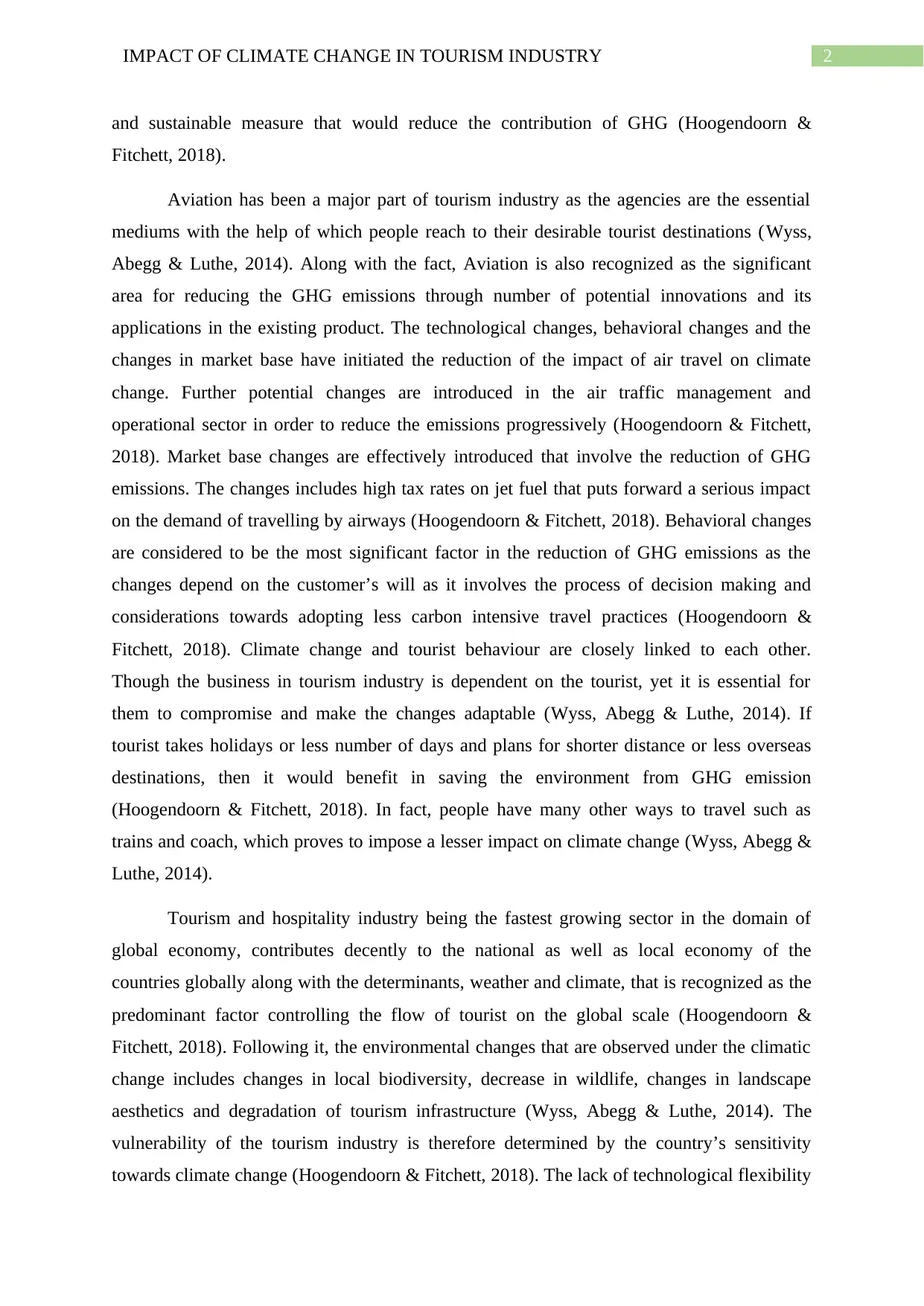
2IMPACT OF CLIMATE CHANGE IN TOURISM INDUSTRY
and sustainable measure that would reduce the contribution of GHG (Hoogendoorn &
Fitchett, 2018).
Aviation has been a major part of tourism industry as the agencies are the essential
mediums with the help of which people reach to their desirable tourist destinations (Wyss,
Abegg & Luthe, 2014). Along with the fact, Aviation is also recognized as the significant
area for reducing the GHG emissions through number of potential innovations and its
applications in the existing product. The technological changes, behavioral changes and the
changes in market base have initiated the reduction of the impact of air travel on climate
change. Further potential changes are introduced in the air traffic management and
operational sector in order to reduce the emissions progressively (Hoogendoorn & Fitchett,
2018). Market base changes are effectively introduced that involve the reduction of GHG
emissions. The changes includes high tax rates on jet fuel that puts forward a serious impact
on the demand of travelling by airways (Hoogendoorn & Fitchett, 2018). Behavioral changes
are considered to be the most significant factor in the reduction of GHG emissions as the
changes depend on the customer’s will as it involves the process of decision making and
considerations towards adopting less carbon intensive travel practices (Hoogendoorn &
Fitchett, 2018). Climate change and tourist behaviour are closely linked to each other.
Though the business in tourism industry is dependent on the tourist, yet it is essential for
them to compromise and make the changes adaptable (Wyss, Abegg & Luthe, 2014). If
tourist takes holidays or less number of days and plans for shorter distance or less overseas
destinations, then it would benefit in saving the environment from GHG emission
(Hoogendoorn & Fitchett, 2018). In fact, people have many other ways to travel such as
trains and coach, which proves to impose a lesser impact on climate change (Wyss, Abegg &
Luthe, 2014).
Tourism and hospitality industry being the fastest growing sector in the domain of
global economy, contributes decently to the national as well as local economy of the
countries globally along with the determinants, weather and climate, that is recognized as the
predominant factor controlling the flow of tourist on the global scale (Hoogendoorn &
Fitchett, 2018). Following it, the environmental changes that are observed under the climatic
change includes changes in local biodiversity, decrease in wildlife, changes in landscape
aesthetics and degradation of tourism infrastructure (Wyss, Abegg & Luthe, 2014). The
vulnerability of the tourism industry is therefore determined by the country’s sensitivity
towards climate change (Hoogendoorn & Fitchett, 2018). The lack of technological flexibility
and sustainable measure that would reduce the contribution of GHG (Hoogendoorn &
Fitchett, 2018).
Aviation has been a major part of tourism industry as the agencies are the essential
mediums with the help of which people reach to their desirable tourist destinations (Wyss,
Abegg & Luthe, 2014). Along with the fact, Aviation is also recognized as the significant
area for reducing the GHG emissions through number of potential innovations and its
applications in the existing product. The technological changes, behavioral changes and the
changes in market base have initiated the reduction of the impact of air travel on climate
change. Further potential changes are introduced in the air traffic management and
operational sector in order to reduce the emissions progressively (Hoogendoorn & Fitchett,
2018). Market base changes are effectively introduced that involve the reduction of GHG
emissions. The changes includes high tax rates on jet fuel that puts forward a serious impact
on the demand of travelling by airways (Hoogendoorn & Fitchett, 2018). Behavioral changes
are considered to be the most significant factor in the reduction of GHG emissions as the
changes depend on the customer’s will as it involves the process of decision making and
considerations towards adopting less carbon intensive travel practices (Hoogendoorn &
Fitchett, 2018). Climate change and tourist behaviour are closely linked to each other.
Though the business in tourism industry is dependent on the tourist, yet it is essential for
them to compromise and make the changes adaptable (Wyss, Abegg & Luthe, 2014). If
tourist takes holidays or less number of days and plans for shorter distance or less overseas
destinations, then it would benefit in saving the environment from GHG emission
(Hoogendoorn & Fitchett, 2018). In fact, people have many other ways to travel such as
trains and coach, which proves to impose a lesser impact on climate change (Wyss, Abegg &
Luthe, 2014).
Tourism and hospitality industry being the fastest growing sector in the domain of
global economy, contributes decently to the national as well as local economy of the
countries globally along with the determinants, weather and climate, that is recognized as the
predominant factor controlling the flow of tourist on the global scale (Hoogendoorn &
Fitchett, 2018). Following it, the environmental changes that are observed under the climatic
change includes changes in local biodiversity, decrease in wildlife, changes in landscape
aesthetics and degradation of tourism infrastructure (Wyss, Abegg & Luthe, 2014). The
vulnerability of the tourism industry is therefore determined by the country’s sensitivity
towards climate change (Hoogendoorn & Fitchett, 2018). The lack of technological flexibility
⊘ This is a preview!⊘
Do you want full access?
Subscribe today to unlock all pages.

Trusted by 1+ million students worldwide
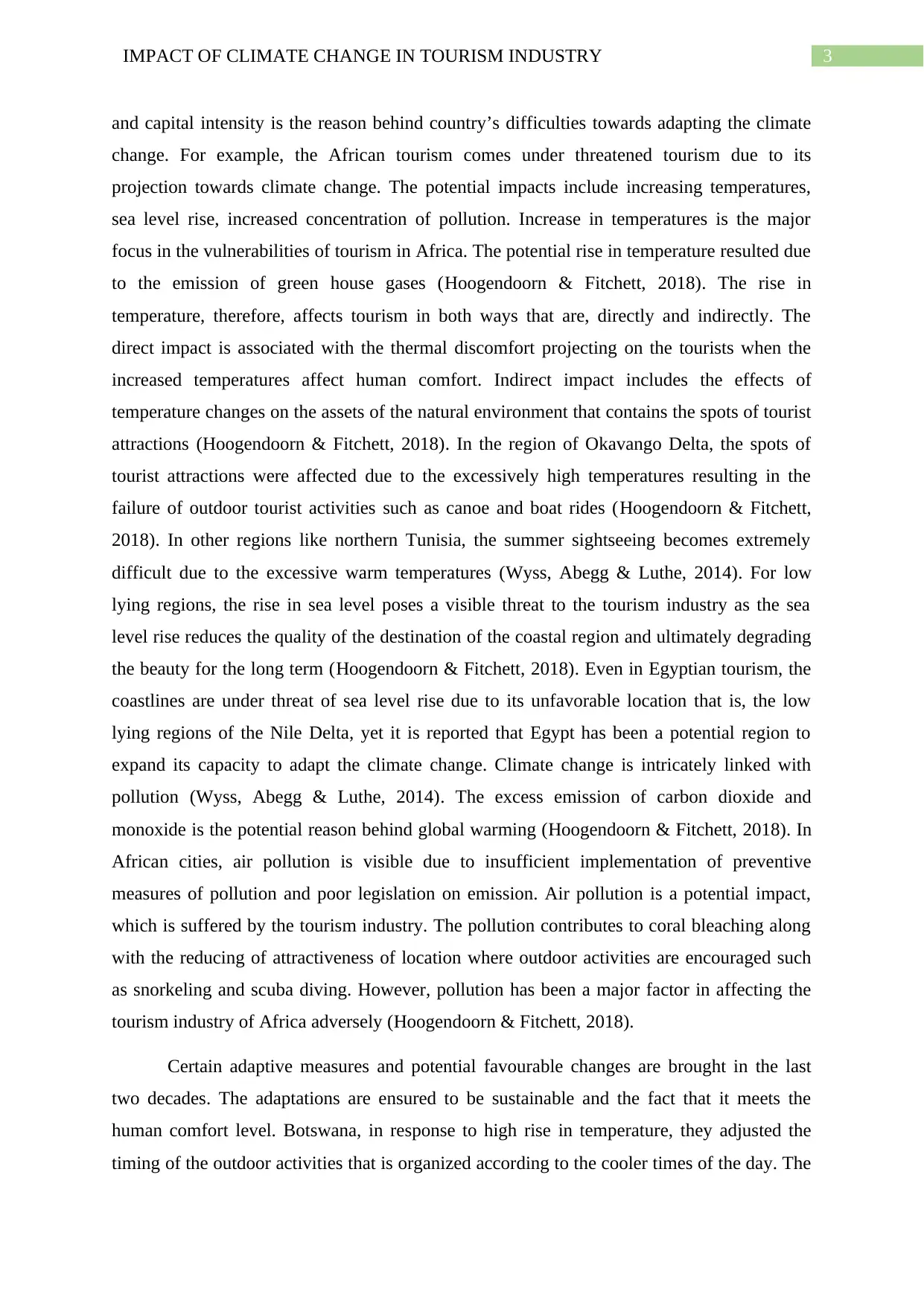
3IMPACT OF CLIMATE CHANGE IN TOURISM INDUSTRY
and capital intensity is the reason behind country’s difficulties towards adapting the climate
change. For example, the African tourism comes under threatened tourism due to its
projection towards climate change. The potential impacts include increasing temperatures,
sea level rise, increased concentration of pollution. Increase in temperatures is the major
focus in the vulnerabilities of tourism in Africa. The potential rise in temperature resulted due
to the emission of green house gases (Hoogendoorn & Fitchett, 2018). The rise in
temperature, therefore, affects tourism in both ways that are, directly and indirectly. The
direct impact is associated with the thermal discomfort projecting on the tourists when the
increased temperatures affect human comfort. Indirect impact includes the effects of
temperature changes on the assets of the natural environment that contains the spots of tourist
attractions (Hoogendoorn & Fitchett, 2018). In the region of Okavango Delta, the spots of
tourist attractions were affected due to the excessively high temperatures resulting in the
failure of outdoor tourist activities such as canoe and boat rides (Hoogendoorn & Fitchett,
2018). In other regions like northern Tunisia, the summer sightseeing becomes extremely
difficult due to the excessive warm temperatures (Wyss, Abegg & Luthe, 2014). For low
lying regions, the rise in sea level poses a visible threat to the tourism industry as the sea
level rise reduces the quality of the destination of the coastal region and ultimately degrading
the beauty for the long term (Hoogendoorn & Fitchett, 2018). Even in Egyptian tourism, the
coastlines are under threat of sea level rise due to its unfavorable location that is, the low
lying regions of the Nile Delta, yet it is reported that Egypt has been a potential region to
expand its capacity to adapt the climate change. Climate change is intricately linked with
pollution (Wyss, Abegg & Luthe, 2014). The excess emission of carbon dioxide and
monoxide is the potential reason behind global warming (Hoogendoorn & Fitchett, 2018). In
African cities, air pollution is visible due to insufficient implementation of preventive
measures of pollution and poor legislation on emission. Air pollution is a potential impact,
which is suffered by the tourism industry. The pollution contributes to coral bleaching along
with the reducing of attractiveness of location where outdoor activities are encouraged such
as snorkeling and scuba diving. However, pollution has been a major factor in affecting the
tourism industry of Africa adversely (Hoogendoorn & Fitchett, 2018).
Certain adaptive measures and potential favourable changes are brought in the last
two decades. The adaptations are ensured to be sustainable and the fact that it meets the
human comfort level. Botswana, in response to high rise in temperature, they adjusted the
timing of the outdoor activities that is organized according to the cooler times of the day. The
and capital intensity is the reason behind country’s difficulties towards adapting the climate
change. For example, the African tourism comes under threatened tourism due to its
projection towards climate change. The potential impacts include increasing temperatures,
sea level rise, increased concentration of pollution. Increase in temperatures is the major
focus in the vulnerabilities of tourism in Africa. The potential rise in temperature resulted due
to the emission of green house gases (Hoogendoorn & Fitchett, 2018). The rise in
temperature, therefore, affects tourism in both ways that are, directly and indirectly. The
direct impact is associated with the thermal discomfort projecting on the tourists when the
increased temperatures affect human comfort. Indirect impact includes the effects of
temperature changes on the assets of the natural environment that contains the spots of tourist
attractions (Hoogendoorn & Fitchett, 2018). In the region of Okavango Delta, the spots of
tourist attractions were affected due to the excessively high temperatures resulting in the
failure of outdoor tourist activities such as canoe and boat rides (Hoogendoorn & Fitchett,
2018). In other regions like northern Tunisia, the summer sightseeing becomes extremely
difficult due to the excessive warm temperatures (Wyss, Abegg & Luthe, 2014). For low
lying regions, the rise in sea level poses a visible threat to the tourism industry as the sea
level rise reduces the quality of the destination of the coastal region and ultimately degrading
the beauty for the long term (Hoogendoorn & Fitchett, 2018). Even in Egyptian tourism, the
coastlines are under threat of sea level rise due to its unfavorable location that is, the low
lying regions of the Nile Delta, yet it is reported that Egypt has been a potential region to
expand its capacity to adapt the climate change. Climate change is intricately linked with
pollution (Wyss, Abegg & Luthe, 2014). The excess emission of carbon dioxide and
monoxide is the potential reason behind global warming (Hoogendoorn & Fitchett, 2018). In
African cities, air pollution is visible due to insufficient implementation of preventive
measures of pollution and poor legislation on emission. Air pollution is a potential impact,
which is suffered by the tourism industry. The pollution contributes to coral bleaching along
with the reducing of attractiveness of location where outdoor activities are encouraged such
as snorkeling and scuba diving. However, pollution has been a major factor in affecting the
tourism industry of Africa adversely (Hoogendoorn & Fitchett, 2018).
Certain adaptive measures and potential favourable changes are brought in the last
two decades. The adaptations are ensured to be sustainable and the fact that it meets the
human comfort level. Botswana, in response to high rise in temperature, they adjusted the
timing of the outdoor activities that is organized according to the cooler times of the day. The
Paraphrase This Document
Need a fresh take? Get an instant paraphrase of this document with our AI Paraphraser
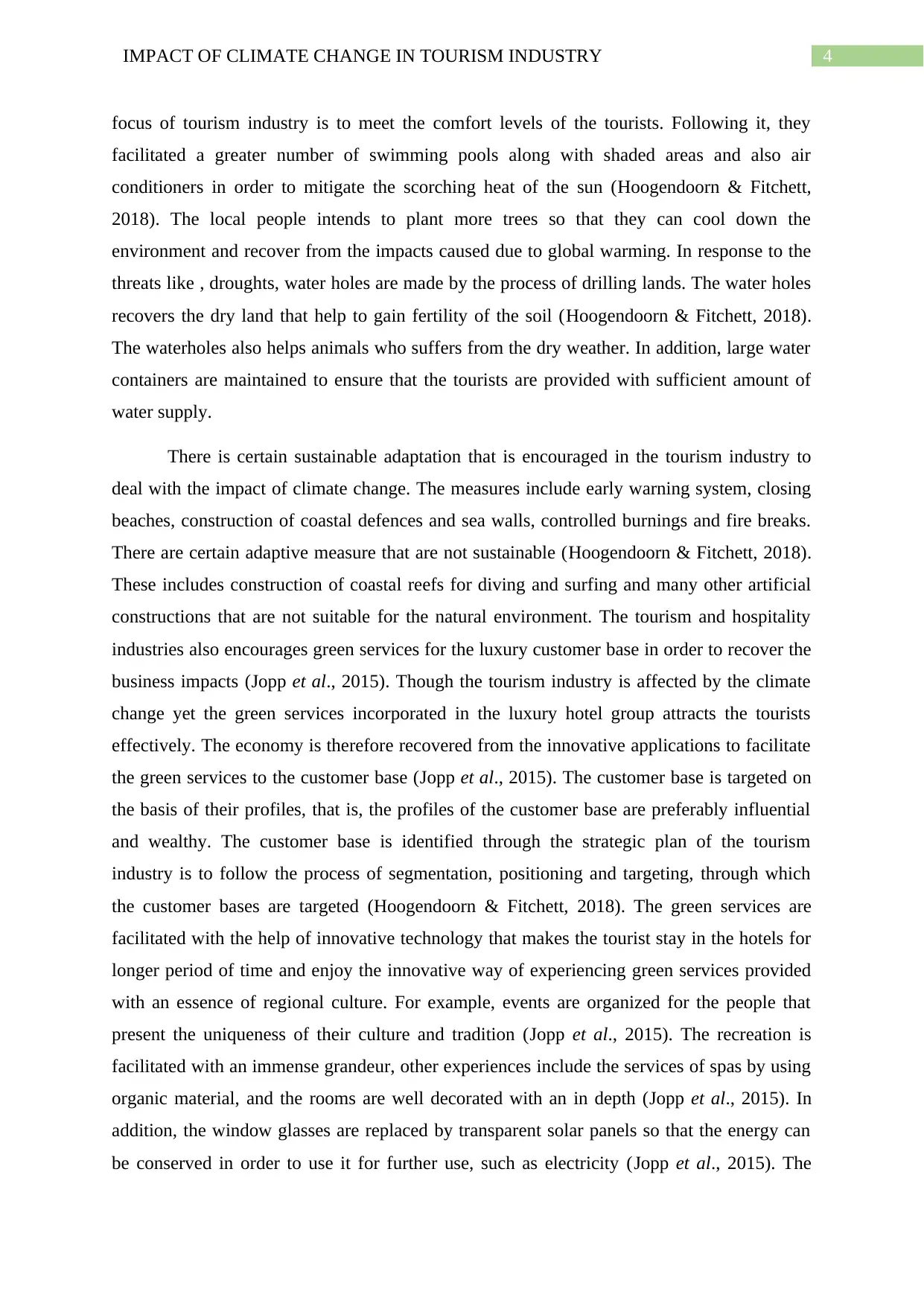
4IMPACT OF CLIMATE CHANGE IN TOURISM INDUSTRY
focus of tourism industry is to meet the comfort levels of the tourists. Following it, they
facilitated a greater number of swimming pools along with shaded areas and also air
conditioners in order to mitigate the scorching heat of the sun (Hoogendoorn & Fitchett,
2018). The local people intends to plant more trees so that they can cool down the
environment and recover from the impacts caused due to global warming. In response to the
threats like , droughts, water holes are made by the process of drilling lands. The water holes
recovers the dry land that help to gain fertility of the soil (Hoogendoorn & Fitchett, 2018).
The waterholes also helps animals who suffers from the dry weather. In addition, large water
containers are maintained to ensure that the tourists are provided with sufficient amount of
water supply.
There is certain sustainable adaptation that is encouraged in the tourism industry to
deal with the impact of climate change. The measures include early warning system, closing
beaches, construction of coastal defences and sea walls, controlled burnings and fire breaks.
There are certain adaptive measure that are not sustainable (Hoogendoorn & Fitchett, 2018).
These includes construction of coastal reefs for diving and surfing and many other artificial
constructions that are not suitable for the natural environment. The tourism and hospitality
industries also encourages green services for the luxury customer base in order to recover the
business impacts (Jopp et al., 2015). Though the tourism industry is affected by the climate
change yet the green services incorporated in the luxury hotel group attracts the tourists
effectively. The economy is therefore recovered from the innovative applications to facilitate
the green services to the customer base (Jopp et al., 2015). The customer base is targeted on
the basis of their profiles, that is, the profiles of the customer base are preferably influential
and wealthy. The customer base is identified through the strategic plan of the tourism
industry is to follow the process of segmentation, positioning and targeting, through which
the customer bases are targeted (Hoogendoorn & Fitchett, 2018). The green services are
facilitated with the help of innovative technology that makes the tourist stay in the hotels for
longer period of time and enjoy the innovative way of experiencing green services provided
with an essence of regional culture. For example, events are organized for the people that
present the uniqueness of their culture and tradition (Jopp et al., 2015). The recreation is
facilitated with an immense grandeur, other experiences include the services of spas by using
organic material, and the rooms are well decorated with an in depth (Jopp et al., 2015). In
addition, the window glasses are replaced by transparent solar panels so that the energy can
be conserved in order to use it for further use, such as electricity (Jopp et al., 2015). The
focus of tourism industry is to meet the comfort levels of the tourists. Following it, they
facilitated a greater number of swimming pools along with shaded areas and also air
conditioners in order to mitigate the scorching heat of the sun (Hoogendoorn & Fitchett,
2018). The local people intends to plant more trees so that they can cool down the
environment and recover from the impacts caused due to global warming. In response to the
threats like , droughts, water holes are made by the process of drilling lands. The water holes
recovers the dry land that help to gain fertility of the soil (Hoogendoorn & Fitchett, 2018).
The waterholes also helps animals who suffers from the dry weather. In addition, large water
containers are maintained to ensure that the tourists are provided with sufficient amount of
water supply.
There is certain sustainable adaptation that is encouraged in the tourism industry to
deal with the impact of climate change. The measures include early warning system, closing
beaches, construction of coastal defences and sea walls, controlled burnings and fire breaks.
There are certain adaptive measure that are not sustainable (Hoogendoorn & Fitchett, 2018).
These includes construction of coastal reefs for diving and surfing and many other artificial
constructions that are not suitable for the natural environment. The tourism and hospitality
industries also encourages green services for the luxury customer base in order to recover the
business impacts (Jopp et al., 2015). Though the tourism industry is affected by the climate
change yet the green services incorporated in the luxury hotel group attracts the tourists
effectively. The economy is therefore recovered from the innovative applications to facilitate
the green services to the customer base (Jopp et al., 2015). The customer base is targeted on
the basis of their profiles, that is, the profiles of the customer base are preferably influential
and wealthy. The customer base is identified through the strategic plan of the tourism
industry is to follow the process of segmentation, positioning and targeting, through which
the customer bases are targeted (Hoogendoorn & Fitchett, 2018). The green services are
facilitated with the help of innovative technology that makes the tourist stay in the hotels for
longer period of time and enjoy the innovative way of experiencing green services provided
with an essence of regional culture. For example, events are organized for the people that
present the uniqueness of their culture and tradition (Jopp et al., 2015). The recreation is
facilitated with an immense grandeur, other experiences include the services of spas by using
organic material, and the rooms are well decorated with an in depth (Jopp et al., 2015). In
addition, the window glasses are replaced by transparent solar panels so that the energy can
be conserved in order to use it for further use, such as electricity (Jopp et al., 2015). The
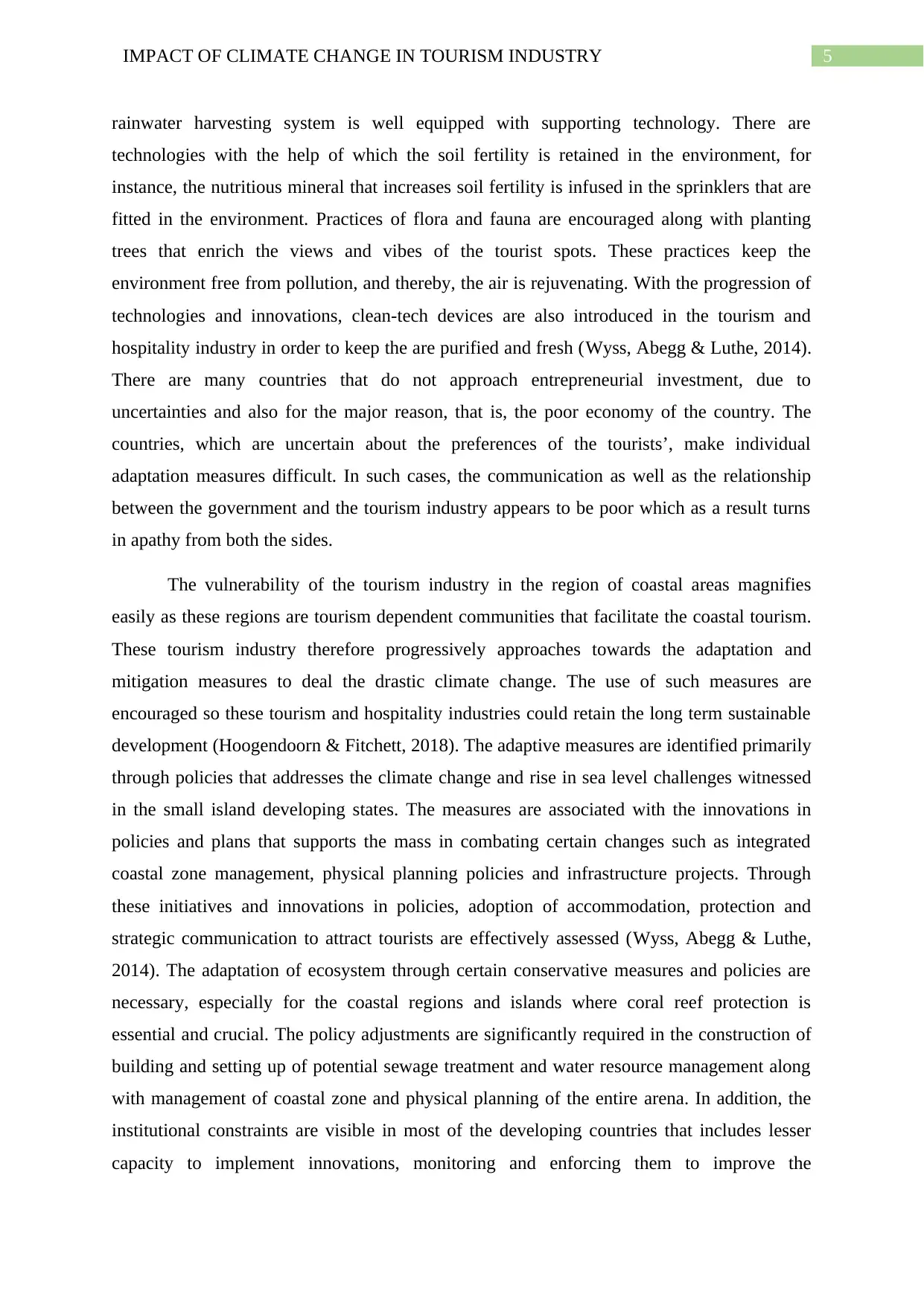
5IMPACT OF CLIMATE CHANGE IN TOURISM INDUSTRY
rainwater harvesting system is well equipped with supporting technology. There are
technologies with the help of which the soil fertility is retained in the environment, for
instance, the nutritious mineral that increases soil fertility is infused in the sprinklers that are
fitted in the environment. Practices of flora and fauna are encouraged along with planting
trees that enrich the views and vibes of the tourist spots. These practices keep the
environment free from pollution, and thereby, the air is rejuvenating. With the progression of
technologies and innovations, clean-tech devices are also introduced in the tourism and
hospitality industry in order to keep the are purified and fresh (Wyss, Abegg & Luthe, 2014).
There are many countries that do not approach entrepreneurial investment, due to
uncertainties and also for the major reason, that is, the poor economy of the country. The
countries, which are uncertain about the preferences of the tourists’, make individual
adaptation measures difficult. In such cases, the communication as well as the relationship
between the government and the tourism industry appears to be poor which as a result turns
in apathy from both the sides.
The vulnerability of the tourism industry in the region of coastal areas magnifies
easily as these regions are tourism dependent communities that facilitate the coastal tourism.
These tourism industry therefore progressively approaches towards the adaptation and
mitigation measures to deal the drastic climate change. The use of such measures are
encouraged so these tourism and hospitality industries could retain the long term sustainable
development (Hoogendoorn & Fitchett, 2018). The adaptive measures are identified primarily
through policies that addresses the climate change and rise in sea level challenges witnessed
in the small island developing states. The measures are associated with the innovations in
policies and plans that supports the mass in combating certain changes such as integrated
coastal zone management, physical planning policies and infrastructure projects. Through
these initiatives and innovations in policies, adoption of accommodation, protection and
strategic communication to attract tourists are effectively assessed (Wyss, Abegg & Luthe,
2014). The adaptation of ecosystem through certain conservative measures and policies are
necessary, especially for the coastal regions and islands where coral reef protection is
essential and crucial. The policy adjustments are significantly required in the construction of
building and setting up of potential sewage treatment and water resource management along
with management of coastal zone and physical planning of the entire arena. In addition, the
institutional constraints are visible in most of the developing countries that includes lesser
capacity to implement innovations, monitoring and enforcing them to improve the
rainwater harvesting system is well equipped with supporting technology. There are
technologies with the help of which the soil fertility is retained in the environment, for
instance, the nutritious mineral that increases soil fertility is infused in the sprinklers that are
fitted in the environment. Practices of flora and fauna are encouraged along with planting
trees that enrich the views and vibes of the tourist spots. These practices keep the
environment free from pollution, and thereby, the air is rejuvenating. With the progression of
technologies and innovations, clean-tech devices are also introduced in the tourism and
hospitality industry in order to keep the are purified and fresh (Wyss, Abegg & Luthe, 2014).
There are many countries that do not approach entrepreneurial investment, due to
uncertainties and also for the major reason, that is, the poor economy of the country. The
countries, which are uncertain about the preferences of the tourists’, make individual
adaptation measures difficult. In such cases, the communication as well as the relationship
between the government and the tourism industry appears to be poor which as a result turns
in apathy from both the sides.
The vulnerability of the tourism industry in the region of coastal areas magnifies
easily as these regions are tourism dependent communities that facilitate the coastal tourism.
These tourism industry therefore progressively approaches towards the adaptation and
mitigation measures to deal the drastic climate change. The use of such measures are
encouraged so these tourism and hospitality industries could retain the long term sustainable
development (Hoogendoorn & Fitchett, 2018). The adaptive measures are identified primarily
through policies that addresses the climate change and rise in sea level challenges witnessed
in the small island developing states. The measures are associated with the innovations in
policies and plans that supports the mass in combating certain changes such as integrated
coastal zone management, physical planning policies and infrastructure projects. Through
these initiatives and innovations in policies, adoption of accommodation, protection and
strategic communication to attract tourists are effectively assessed (Wyss, Abegg & Luthe,
2014). The adaptation of ecosystem through certain conservative measures and policies are
necessary, especially for the coastal regions and islands where coral reef protection is
essential and crucial. The policy adjustments are significantly required in the construction of
building and setting up of potential sewage treatment and water resource management along
with management of coastal zone and physical planning of the entire arena. In addition, the
institutional constraints are visible in most of the developing countries that includes lesser
capacity to implement innovations, monitoring and enforcing them to improve the
⊘ This is a preview!⊘
Do you want full access?
Subscribe today to unlock all pages.

Trusted by 1+ million students worldwide
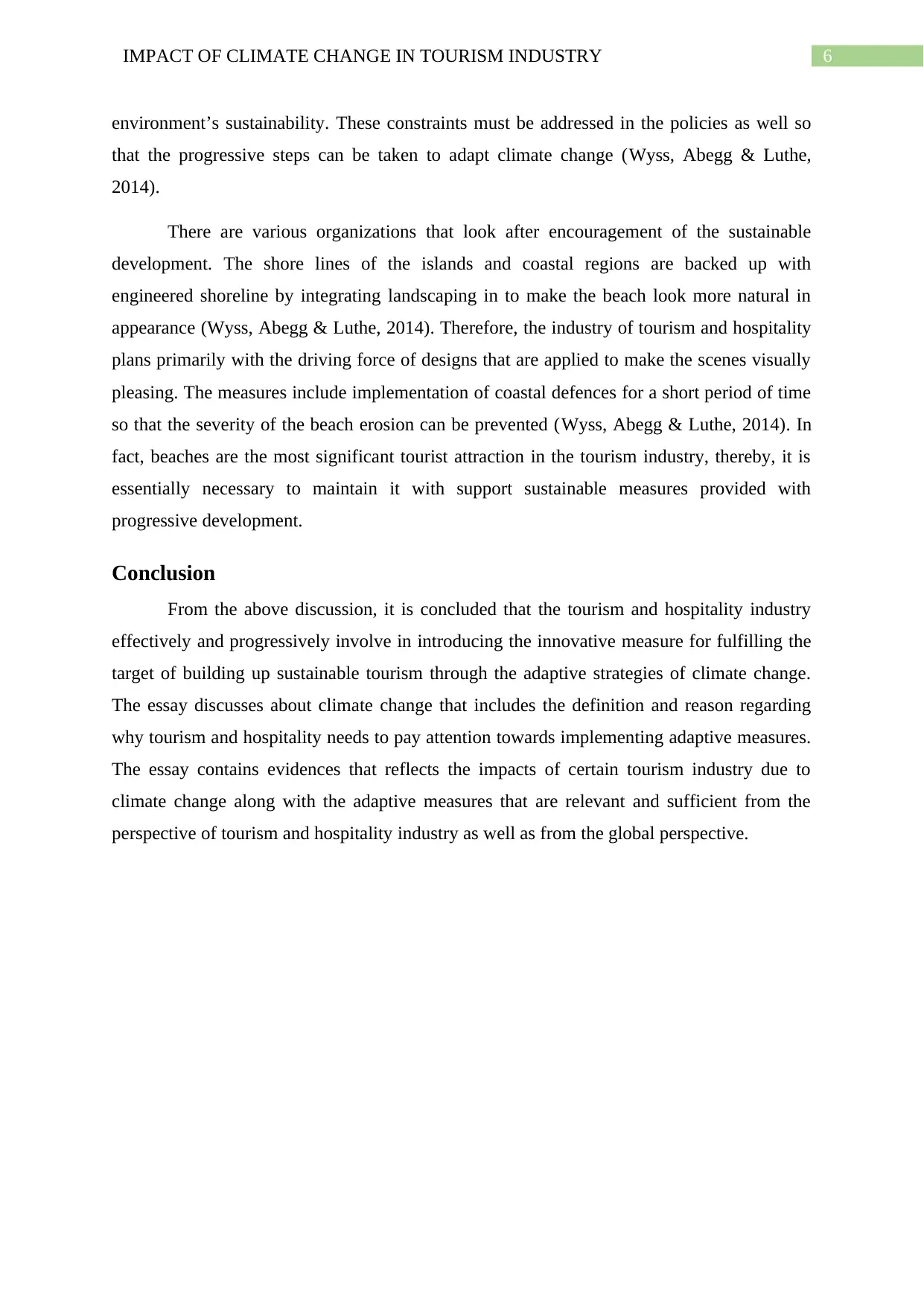
6IMPACT OF CLIMATE CHANGE IN TOURISM INDUSTRY
environment’s sustainability. These constraints must be addressed in the policies as well so
that the progressive steps can be taken to adapt climate change (Wyss, Abegg & Luthe,
2014).
There are various organizations that look after encouragement of the sustainable
development. The shore lines of the islands and coastal regions are backed up with
engineered shoreline by integrating landscaping in to make the beach look more natural in
appearance (Wyss, Abegg & Luthe, 2014). Therefore, the industry of tourism and hospitality
plans primarily with the driving force of designs that are applied to make the scenes visually
pleasing. The measures include implementation of coastal defences for a short period of time
so that the severity of the beach erosion can be prevented (Wyss, Abegg & Luthe, 2014). In
fact, beaches are the most significant tourist attraction in the tourism industry, thereby, it is
essentially necessary to maintain it with support sustainable measures provided with
progressive development.
Conclusion
From the above discussion, it is concluded that the tourism and hospitality industry
effectively and progressively involve in introducing the innovative measure for fulfilling the
target of building up sustainable tourism through the adaptive strategies of climate change.
The essay discusses about climate change that includes the definition and reason regarding
why tourism and hospitality needs to pay attention towards implementing adaptive measures.
The essay contains evidences that reflects the impacts of certain tourism industry due to
climate change along with the adaptive measures that are relevant and sufficient from the
perspective of tourism and hospitality industry as well as from the global perspective.
environment’s sustainability. These constraints must be addressed in the policies as well so
that the progressive steps can be taken to adapt climate change (Wyss, Abegg & Luthe,
2014).
There are various organizations that look after encouragement of the sustainable
development. The shore lines of the islands and coastal regions are backed up with
engineered shoreline by integrating landscaping in to make the beach look more natural in
appearance (Wyss, Abegg & Luthe, 2014). Therefore, the industry of tourism and hospitality
plans primarily with the driving force of designs that are applied to make the scenes visually
pleasing. The measures include implementation of coastal defences for a short period of time
so that the severity of the beach erosion can be prevented (Wyss, Abegg & Luthe, 2014). In
fact, beaches are the most significant tourist attraction in the tourism industry, thereby, it is
essentially necessary to maintain it with support sustainable measures provided with
progressive development.
Conclusion
From the above discussion, it is concluded that the tourism and hospitality industry
effectively and progressively involve in introducing the innovative measure for fulfilling the
target of building up sustainable tourism through the adaptive strategies of climate change.
The essay discusses about climate change that includes the definition and reason regarding
why tourism and hospitality needs to pay attention towards implementing adaptive measures.
The essay contains evidences that reflects the impacts of certain tourism industry due to
climate change along with the adaptive measures that are relevant and sufficient from the
perspective of tourism and hospitality industry as well as from the global perspective.
Paraphrase This Document
Need a fresh take? Get an instant paraphrase of this document with our AI Paraphraser
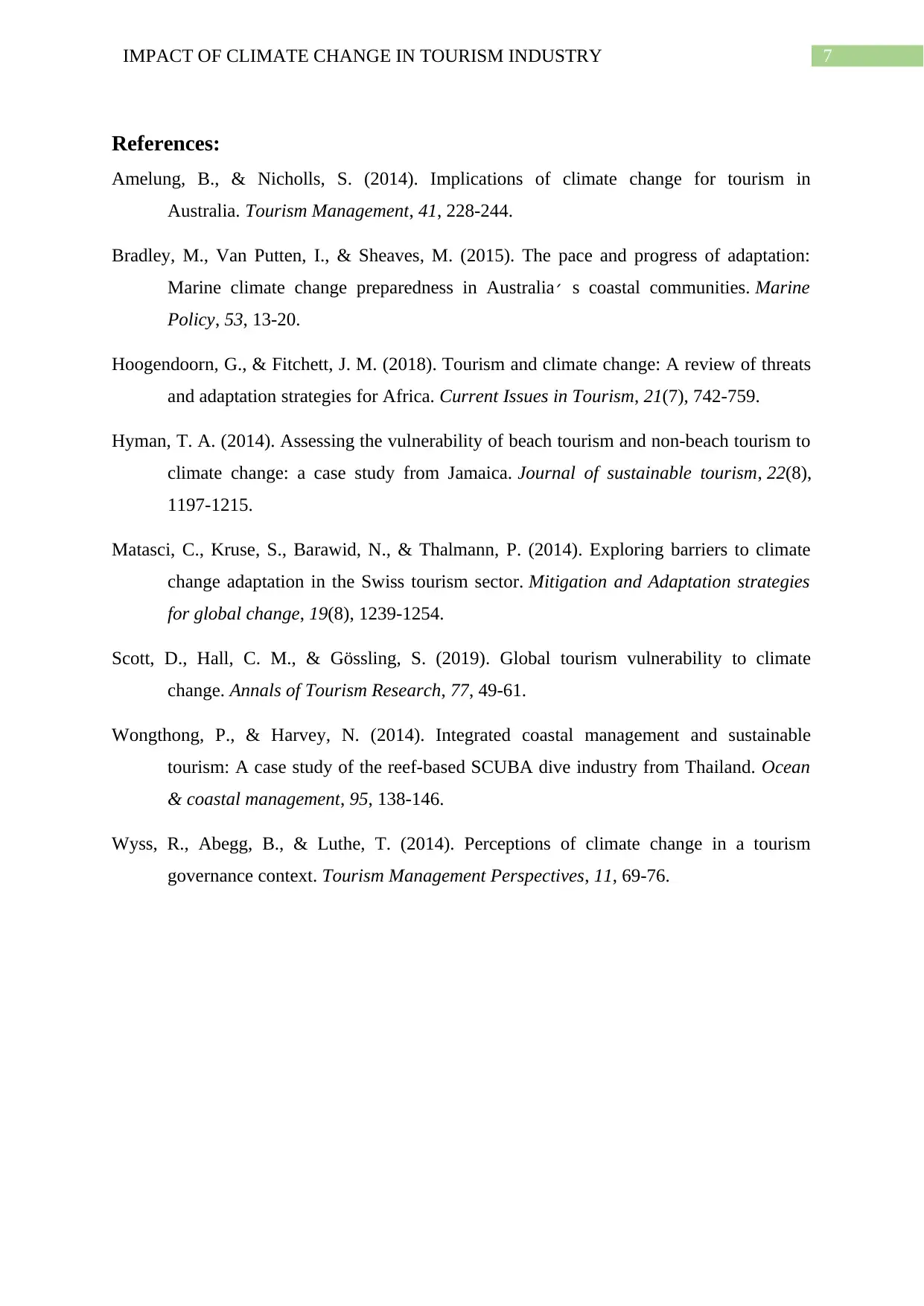
7IMPACT OF CLIMATE CHANGE IN TOURISM INDUSTRY
References:
Amelung, B., & Nicholls, S. (2014). Implications of climate change for tourism in
Australia. Tourism Management, 41, 228-244.
Bradley, M., Van Putten, I., & Sheaves, M. (2015). The pace and progress of adaptation:
Marine climate change preparedness in Australia׳ s coastal communities. Marine
Policy, 53, 13-20.
Hoogendoorn, G., & Fitchett, J. M. (2018). Tourism and climate change: A review of threats
and adaptation strategies for Africa. Current Issues in Tourism, 21(7), 742-759.
Hyman, T. A. (2014). Assessing the vulnerability of beach tourism and non-beach tourism to
climate change: a case study from Jamaica. Journal of sustainable tourism, 22(8),
1197-1215.
Matasci, C., Kruse, S., Barawid, N., & Thalmann, P. (2014). Exploring barriers to climate
change adaptation in the Swiss tourism sector. Mitigation and Adaptation strategies
for global change, 19(8), 1239-1254.
Scott, D., Hall, C. M., & Gössling, S. (2019). Global tourism vulnerability to climate
change. Annals of Tourism Research, 77, 49-61.
Wongthong, P., & Harvey, N. (2014). Integrated coastal management and sustainable
tourism: A case study of the reef-based SCUBA dive industry from Thailand. Ocean
& coastal management, 95, 138-146.
Wyss, R., Abegg, B., & Luthe, T. (2014). Perceptions of climate change in a tourism
governance context. Tourism Management Perspectives, 11, 69-76.
References:
Amelung, B., & Nicholls, S. (2014). Implications of climate change for tourism in
Australia. Tourism Management, 41, 228-244.
Bradley, M., Van Putten, I., & Sheaves, M. (2015). The pace and progress of adaptation:
Marine climate change preparedness in Australia׳ s coastal communities. Marine
Policy, 53, 13-20.
Hoogendoorn, G., & Fitchett, J. M. (2018). Tourism and climate change: A review of threats
and adaptation strategies for Africa. Current Issues in Tourism, 21(7), 742-759.
Hyman, T. A. (2014). Assessing the vulnerability of beach tourism and non-beach tourism to
climate change: a case study from Jamaica. Journal of sustainable tourism, 22(8),
1197-1215.
Matasci, C., Kruse, S., Barawid, N., & Thalmann, P. (2014). Exploring barriers to climate
change adaptation in the Swiss tourism sector. Mitigation and Adaptation strategies
for global change, 19(8), 1239-1254.
Scott, D., Hall, C. M., & Gössling, S. (2019). Global tourism vulnerability to climate
change. Annals of Tourism Research, 77, 49-61.
Wongthong, P., & Harvey, N. (2014). Integrated coastal management and sustainable
tourism: A case study of the reef-based SCUBA dive industry from Thailand. Ocean
& coastal management, 95, 138-146.
Wyss, R., Abegg, B., & Luthe, T. (2014). Perceptions of climate change in a tourism
governance context. Tourism Management Perspectives, 11, 69-76.
1 out of 8
Related Documents
Your All-in-One AI-Powered Toolkit for Academic Success.
+13062052269
info@desklib.com
Available 24*7 on WhatsApp / Email
![[object Object]](/_next/static/media/star-bottom.7253800d.svg)
Unlock your academic potential
Copyright © 2020–2026 A2Z Services. All Rights Reserved. Developed and managed by ZUCOL.





